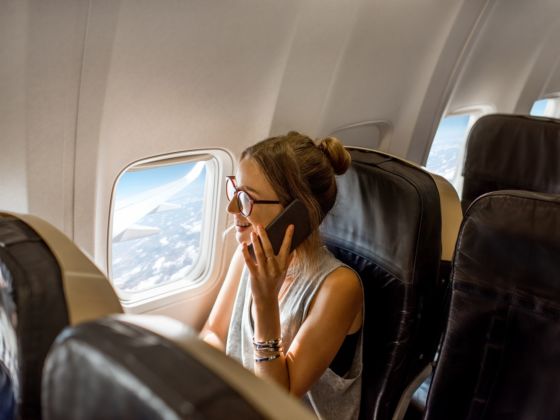It’s a lesson you should have been taught at age four, right about the time you tried eating paste: just because you CAN do something, doesn’t mean you SHOULD. This applies not only to ingesting adhesives, but to talking on your cell phone while on an airplane. A recent study from Turkish Airlines found that while making calls at 35,000 feet might be possible in the era of high-speed, in-flight Wi-Fi, almost nobody in America thinks you should do it.

Can You Make Wi-Fi Voice Calls on Airplanes?
The study, titled the “Turkish Airlines U.S. Aviation Trends 2017 Report,” surveyed passengers around the world and found that a whopping 89 percent of Americans are strongly opposed to allowing in-flight voice calls, citing nuisance and disturbance as their main reasons.
Interestingly, some other countries didn’t seem to mind as much, with 73 percent of Indian passengers, 70 percent of Chinese, and 63 percent of Emiratis favoring in-flight phone calls over Wi-Fi. This may be why over 24 foreign airlines allow Wi-Fi voice calls (when not in American airspace), including Emirates and nearly every airline in India.
In America, however, public sentiment is still strongly against it. Which is why, despite advances in technology that make it completely safe, it’s illegal. That’s right: illegal. Here’s why.
A real safety concern is now just a nuisance
Once upon a time, airlines banned all cell phone calls as a matter of safety: The cellular signal sometimes interfered with pilots’ radio communications, so the FCC enacted a blanket ban on cell phone use in 1991. However, as phones became more sophisticated and the signal wasn’t really much of a safety risk, in 2013 then-FCC chief Tom Wheeler proposed changing rules that he called “outdated” to allow more in-flight phone use. Because the government moves about as fast as a high school offensive lineman, it took a while for any changes to be considered.
By 2016, in-flight Wi-Fi had gotten faster. Fast enough to allow voice calls using WhatsApp, Wi-Fi calling, Facebook, or a litany of other platforms without taking our phones out of airplane mode. This loophole may have fallen outside of the FCC regulation, which simply read that “Cellular telephones installed in or carried aboard airplanes, balloons, or any other type of aircraft must not be operated while such aircrafts are airborne.” Clearly, that’s up to interpretation, even in a Wi-Fi-equipped balloon.
So in late 2016, the Department of Transportation looked at allowing airlines to make their own determinations as to whether they allowed voice calls. It didn’t sit well with the flying public, to say the least. Over 7,000 comments strongly urging the FCC to uphold its ban were logged. And flight crews were overwhelmingly unanimous in their opposition.
The International Association of Machinists, a union representing pilots and flight attendants, said in a statement “(Voice calls) would increase cabin noise levels, making it difficult for flight attendants to communicate important safety announcements to passengers…It is a certainty that flight attendants will have to de-escalate cabin situations due to hostility between passengers emanating from in-flight voice calls.”
Basically, if you thought fights over seat-reclining were getting out of control, you ain’t seen nothing yet. The union also argued that, in theory, terrorists could use voice calls to coordinate attacks onboard planes. And who can argue with anything stopping terrorists?
Airlines weighed in too, as United — mired in its 2017 string of PR crises — announced it would continue to prohibit voice calls no matter what the regulations were.
As a result, in April of 2017 the ban was upheld, and the FCC effectively prohibited all onboard voice calls. “Taking it off the table repentantly will be a victory for Americans across the country who, like me, value a moment of quiet at 30,000 feet,” FCC chairman Ajit Pai said when announcing the decision. Americans breathed a collective sigh of relief, overbearing bosses and needy boyfriends were dealt a serious blow, and the skies remained relatively quiet for the foreseeable future.
So if you were considering your cross-country flight as a great chance to catch up with Nana, think again. Wi-Fi calls are still prohibited on airplanes and will be until Americans change their minds. Does that mean the girl next to you might still insist on FaceTiming her “squad” while you’re trying to catch a few Z’s from LA to Dallas? Of course it does. And, like with a lot of things, the flight attendants might not stop her. It’s up to you whether to rat her out and cause, as the union predicted, a “cabin situation.” Or just invest in a pair of noise-cancelling headphones, snap a video, and post it to Passenger Shaming.